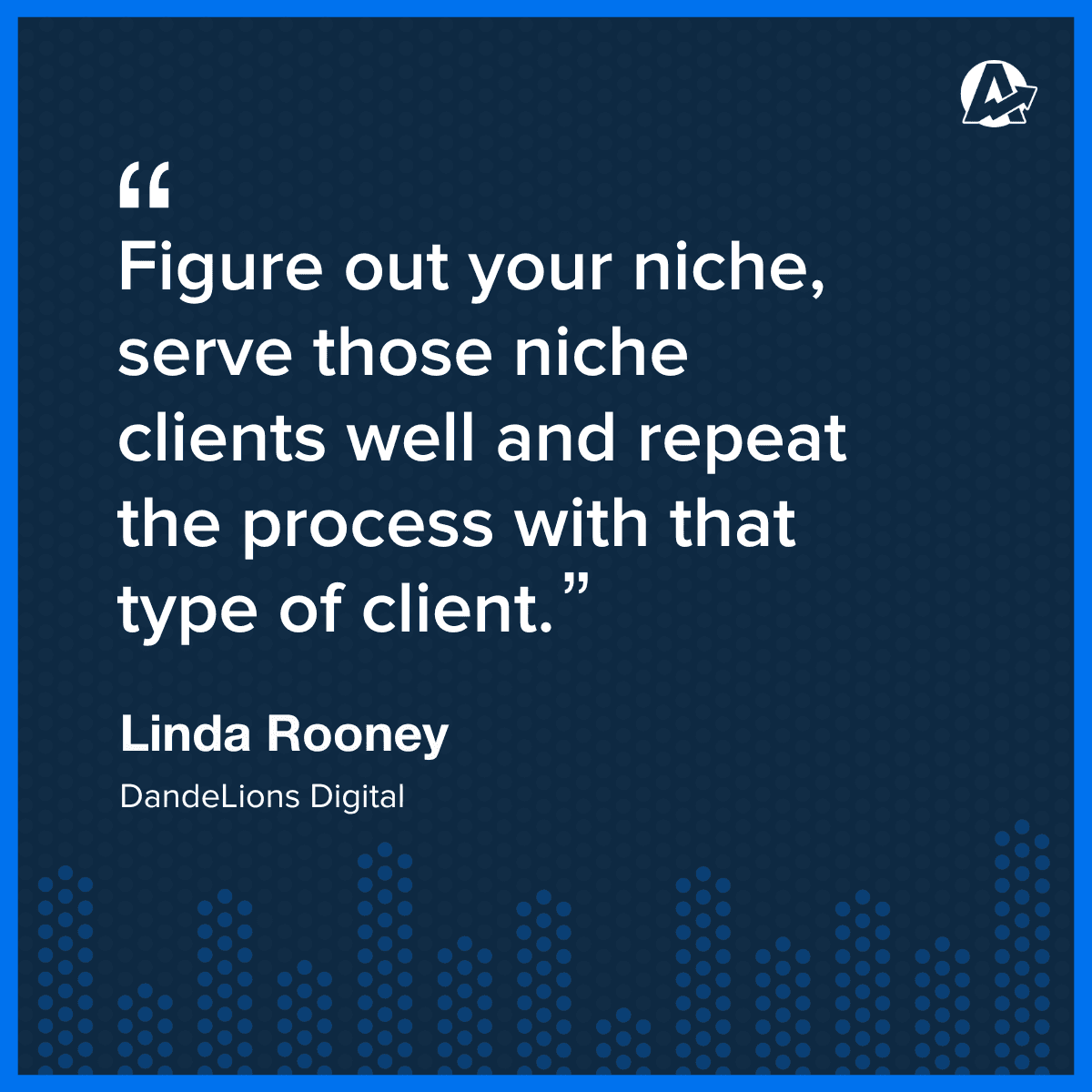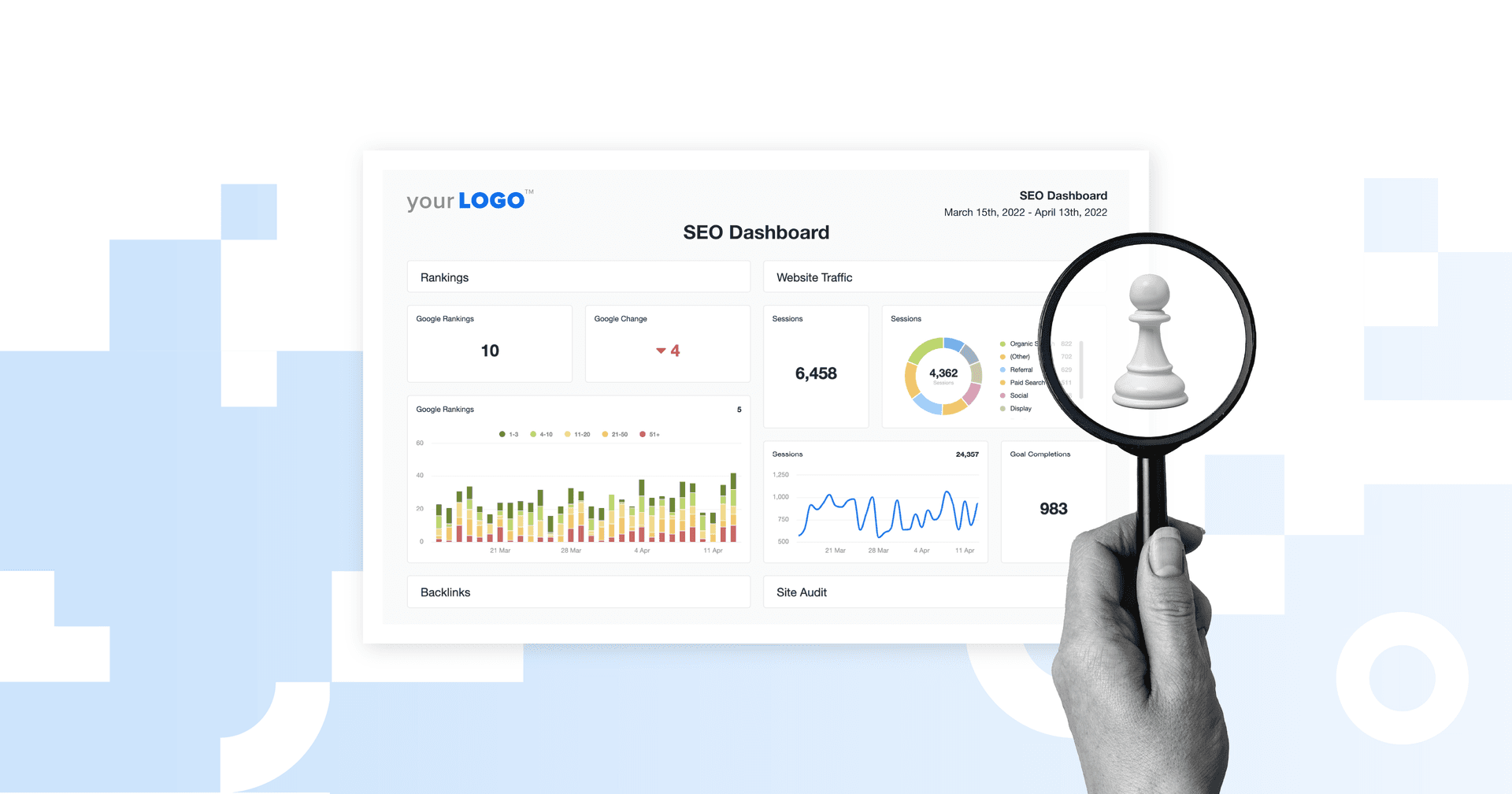Table of Contents
Table of Contents
- Six Simple Steps to Find Your Niche: A Practical Framework
- Step 1: Aligning Agency Competencies to Find Your Marketing Agency Niche
- Step 2: Conducting Market Research to Find a Specific Niche
- Step 3: Evaluating the Sustainability and Profitability of Your Niche
- Step 4: Questions to Ask When Finding the Right Niche for the Agency
- Step 5: Building a Strategy for Niche Specialization
- Step 6: Avoiding Common Pitfalls in Niche Specialization
- Summary and Key Takeaways
7,000+ agencies have ditched manual reports. You can too.
Free 14-Day TrialQUICK SUMMARY:
Choosing a niche for a marketing agency is a path that many look to for business success. Learning how to niche an agency helps align strengths with market demands. This guide offers a step-by-step framework to evaluate options, plan strategically, and avoid common mistakes.
Choosing the right niche for a marketing agency is a decision that can set the course for success or failure. It's not a whim or a random choice; it's a strategic maneuver that requires thoughtful planning and a solid understanding of your agency's passions and your team's core competencies.
Although you might be tempted to enter a specific niche because there is a large market available--the size of the niche is not (and should not) be the only factor that you consider, there are many other pieces of this particular puzzle that are also important to finding the right opportunity for your agency.

The right niche aligns with the agency's strengths, target audience, and unique services, driving agency growth, profitability, and client satisfaction.
This article provides an in-depth exploration of the step-by-step process for identifying and leveraging a niche that's in harmony with your core competencies and market demands.
Six Simple Steps to Find Your Niche: A Practical Framework
With a myriad of choices available, selecting the right marketing agency niche is about finding that sweet spot where passion meets expertise and opportunities meet execution.
Whether you're launching a new business venture, looking to refine your existing approach, or wanting to find a new direction, understanding how to find a niche is vital in shaping a sustainable and successful agency strategy.
It's time to roll up your sleeves and get started. The journey to find your niche awaits, and it begins with the proper framework and a willingness to take an informed leap.
Step 1: Aligning Agency Competencies to Find Your Marketing Agency Niche
Choosing the optimal niche for a marketing agency requires a thoughtful approach that aligns the agency's inherent strengths with market needs.
This synergy between what an agency does best and what the market demands can foster greater success and differentiation. The process entails recognizing the agency's fundamental competencies and services, aligning these strengths with promising niches, and pursuing areas that resonate with the leadership's interests and expertise.
This alignment not only leverages the agency's unique abilities but also builds a foundation for sustainable growth and innovation.
Identifying Core Competencies and Services
Every marketing agency has a unique set of skills, expertise, and services they offer. These may range from content creation and SEO to social media marketing and PPC advertising. Or, perhaps, it's all about aligning your services around a particular vertical that you know and love.
For example, Kim and Brian Walker, co-founders of Louisiana-based Shop Marketing Pros, launched their marketing agency based on their first-hand experience in the automotive industry.
Our hearts were in the automotive world because that’s what we knew and where we felt like we needed to be.
Kim Walker, Co-Founder, Shop Marketing Pros
Identifying these core competencies involves critically assessing what the agency does best and what differentiates it from competitors. These distinct skills form the agency's value proposition foundation and guide the search for a niche that can benefit from these specialized services. Understanding these core competencies also helps craft targeted strategies and tailor-made solutions for clients within the chosen digital marketing niche.

Matching Strengths with Potential Niches
Once the agency’s core competencies have been identified, the next step is to match those strengths with potential niches where those skills can be most effectively utilized. This involves analyzing the broader market, identifying segments with a genuine need or demand for the agency's specialized services, and determining where competitors may fall short.
Dan Delmain understands this process all too well. His agency started out by providing digital marketing services to a wide variety of small business clients. Over time, Delmain noticed a pattern of repeatable processes in several verticals, including contractors, lawyers, and dentists. When he took some time to dig into which market might make the most sense to focus on, he realized that working with dentists proved to be more rewarding to work with than others. Since niching down, their agency has grown to 20 full-time employees that serve over 130 dental clients.
Becoming niche-specific allows you to do certain things that you couldn’t do otherwise, like speak the language of your client, quickly figure out what works and what doesn’t from an advertising standpoint, and create scalable internal operations.
Dan Delmain, Founder, :Delmain
In the end, it's about finding the sweet spot where the agency's unique skills intersect with real market opportunities. This alignment ensures that the agency provides unique value to its clients and positions it to become a leader in that niche, enhancing its reputation and profitability.
Following Your Passions as an Agency Leader
The decision to specialize in a particular niche should also align with the passions and values of the agency's leadership. Running a successful agency requires dedication, creativity, and a willingness to invest in continuous learning and development. When the chosen niche resonates with the interests and values of the agency's leaders, it fuels a genuine enthusiasm that translates into higher-quality service, innovative solutions, and a more engaged and committed team.
For example, Terrayn Dispensary Marketing took on an industry niche that many are afraid to tackle. While some find the complexities of cannabis marketing overwhelming, Trevor Shirk, CEO and Founder of Terrayn, reveled at the idea of creating a playbook for a burgeoning industry. And it worked! Within a few years, Terrayn has become of the leading cannabis marketing agencies, servicing nearly 400 clients.
We just saw a really strong need and knew we could help. So I thought, instead of helping all these other industries, what if we just became really good at this one?
Trevor Shirk, CEO and Founder, Terrayn Dispensary Marketing
This alignment of passion with the agency's niche also helps build a solid brand identity and foster a loyal customer base, as clients recognize and connect with the authenticity and commitment that comes from working with a team that genuinely loves what they do.
When executed thoughtfully, this alignment lays the groundwork for an agency that is profitable, fulfilled, engaged, and poised to make a significant impact in its chosen niche.

Step 2: Conducting Market Research to Find a Specific Niche
Finding a specific niche that aligns with your agency's core competencies requires more than intuition; it demands comprehensive market research. This research will guide you in understanding the current market landscape, assessing the needs and opportunities within that landscape, and identifying gaps where your agency can provide unique value.
When it comes to understanding the needs and pain points of our preferred industries, it's important to focus on existing clients in that niche. We can use surveys, interviews, focus groups, and observation to gain valuable insights. We also use "broad stroke" techniques in the industry itself by way of forums, meeting groups and associations they are members of. With this information, we can build a better understanding of our target niche and better serve its needs.
William Smith, Founder, Local Search Technologies
Conducting market research to find a specific niche involves two critical stages: assessing market needs and opportunities and identifying gaps and opportunities. Let’s dive into these stages to understand how they enable a niche agency to position itself effectively.
Assessing Market Needs and Opportunities
Understanding what potential clients need and where opportunities lie is the cornerstone of selecting the right niche. To start this assessment:
Identify Target Customers: Define the specific types of clients your agency wants to serve within a niche. This could include businesses of a specific size, industry, or geographic location.
Analyze Customer Pain Points: Determine what challenges and pain points these clients face. Providing marketing services is a way to address them.
Evaluate Market Trends and Dynamics: Look at current industry trends and dynamics within the potential niche, such as emerging technologies or regulatory changes that may create new opportunities.
Competitor Analysis: Assess what competitors are doing in the space, and identify where they might be falling short or where there may be a unique niche for your agency.
The collected data will provide a comprehensive picture of the market needs and opportunities, helping the agency focus on areas where it can make a real difference.
Identifying Gaps and Opportunities
After assessing market needs, the next step is to identify the specific gaps and opportunities where the agency's competencies can fill a void:
Spot Unmet Needs: Through the research, pinpoint areas where current providers are not meeting client needs or lacking specialized services.
Analyze Search Volume and Social Signals: Utilize tools like Google Trends and Keyword Planner to understand what potential clients are searching for and where interest is concentrated.
Evaluate Profitability: Assess the potential profitability of entering the niche by looking at customer lifetime value, conversion rates, and overall market size.
Create a Value Proposition: Based on the identified gaps, craft a unique value proposition that sets your agency apart from competitors and speaks directly to the unmet needs within the niche.
By conducting rigorous market research and aligning it with the agency’s strengths and passions, you can find a specific niche where your agency will thrive and provide exceptional value to your clients. Identifying these gaps and opportunities ensures that the chosen niche aligns with both the agency’s competencies and the genuine needs of the market, setting the stage for a successful and fulfilling specialization.

Step 3: Evaluating the Sustainability and Profitability of Your Niche
Choosing the best digital marketing niche isn't just about meeting market demands; it's also about ensuring the niche is financially viable for the long term. It's crucial to evaluate profitability and sustainability by forecasting revenue, estimating delivery costs and profit margins, and assessing long-term viability.
The main focus is to offer one solution, for one main problem, to one main type of client. This makes all marketing material, lead generation tactics & our own content marketing easier to manage which in turn contributes to more growth.
Guy Hudson, Founder, Bespoke Marketing Plans
This rigorous analysis will provide a solid foundation to create a profitable business in a chosen digital marketing niche.
Forecasting Revenue
Forecasting revenue is the first step toward understanding the profitability of your niche. This process includes:
Analyzing Market Demand: Determine the demand for your agency's specific services within the niche. This involves studying industry trends, client requirements, and competitor pricing.
Setting Pricing Strategies: Establish a clear pricing strategy for your services, considering competitors' prices and the value you're offering.
Projecting Sales Volume: Estimate the potential number of clients and the frequency of their purchases. This will give a clear picture of the expected revenue over a specific time frame.
Identifying Upselling and Cross-Selling Opportunities: Look for opportunities to increase revenue through related services or products, adding value to your existing offerings.
Estimating Delivery Costs and Profit Margins
The next step is to evaluate how building a profitable business in the chosen niche will impact your delivery costs and profit margins:
Analyzing Delivery Costs: Assess the expenses involved in delivering your services. This includes staffing, technology, marketing costs, and other operational fees.
Calculating Profit Margins: Subtracting the delivery costs from the forecasted revenue gives you the profit margins. Ensuring that the margins align with your agency's financial goals is essential.
Identifying Potential Cost Savings: Look for efficiencies and productivity improvements that can be gained in delivering the services, which could further increase profitability. This might involve optimizing processes, leveraging technology (such as AI data analysis tools for marketing agencies), or negotiating with suppliers.
Assessing Long-Term Viability
The final step is to assess the long-term viability of the profitable niche:
Evaluating Market Trends: Keep an eye on the long-term trends within the niche. Is it growing? Are there emerging technologies or regulations that could impact it? How vulnerable is this niche to market fluctuations or economic downturns?
Assessing Competitive Landscape: Evaluate the sustainability of your competitive advantage. What are the barriers to entry for new competitors? How easily can existing competitors replicate your services?
Monitoring Customer Retention: Analyzing client loyalty and satisfaction provides insight into the long-term relationships you are building. Happy clients are likely to stay, ensuring ongoing revenue.
Evaluating the profitability and sustainability of a niche requires carefully examining the financial aspects of entering that space. By considering revenue forecasts, delivery costs, profit margins, and long-term viability, agencies can make informed decisions aligning with their market strategy and financial goals. It is a critical step in ensuring that the agency's foray into a new niche is strategically sound and financially profitable.
Our agency focuses on the Power Washing industry, but we also work with other home service companies. By specializing in one niche we are able to test SEO strategies in multiple cities and states and use what works for other new clients we bring on. It makes keyword research and tactics much easier to implement and provides better results for our clients as well!
Zeke Domowski, Owner, Creatively Innovative
Step 4: Questions to Ask When Finding the Right Niche for the Agency
Entering a niche market is a significant decision that can shape an agency's future. It requires careful consideration and understanding of various factors that may affect success in that niche. Selecting the right business niche can lead to a thriving niche business, while a poor choice might lead to unmet expectations. The following questions can guide an entrepreneur or agency owner in making this critical decision:
Is the Niche Scalable and Adaptable?
Understanding Scalability: Assess if the niche may grow with your agency. Can you quickly expand your product or service offerings within the niche? What are the growth prospects?
Evaluating Adaptability: Determine if the niche allows flexibility. Can your agency adapt to changing market trends or client needs within the niche? Is there room to innovate?
What Resources Are Required to Enter a Niche?
Identifying Required Investments: What are the initial investments needed to enter the niche? This includes technology, staff training, marketing, etc.
Assessing Ongoing Costs: What are the ongoing operational costs? This includes the costs of delivering products and services, maintaining quality, etc.
What Is the Competitive Landscape Within the Niche?
Analyzing Competitors: Who are the main competitors within the niche? What unique selling propositions do they have, and how can you differentiate your agency?
Evaluating Barriers to Entry: Are there significant barriers that might hinder a small business from entering or succeeding in the niche?
How Well Does the Niche Strategy Align with Your Agency’s Brand?
Brand Alignment: Does the niche align with your agency's brand and values? A mismatch can lead to confusion among your target audience or a need to rebrand the agency to better align with the niche.
Brand Extension Potential: Can the agency extend its existing brand into the niche without diluting or conflicting with the current brand identity?
Can You Establish a Unique Selling Proposition Within the Niche?
Identifying Unique Value: What unique selling proposition can your agency bring to this business niche? How can you stand out from the competition?
Assessing Potential for Innovation: Is there room to innovate within the niche, or is it saturated with similar products and services?
Is There a Sufficient Customer Base for the Business Niche?
Customer Demand Analysis: Assess if sufficient demand for your product or service within the niche exists. Is there a loyal customer base that is underserved?
Affordability Index: Can the target client afford the agency's services on an ongoing basis. It's one thing to find a gap in the market, but if the niche can't afford your services, it will continue to be underserved.
What Are the Long-Term Prospects for the Niche?
Evaluating Trends and Sustainability: What are the long-term trends within the niche? Is it a fad or a sustainable business opportunity?
Assessing Regulatory Risks: Are there potential regulatory changes that might affect the niche? Being aware of possible legal changes can prevent future issues.
By carefully considering these questions, an agency owner can develop a clear understanding of the opportunities and challenges of entering a specific niche. It involves assessing scalability, resources, competition, alignment with brand values, unique selling propositions, customer base, and long-term prospects. Taking the time to thoroughly evaluate these aspects can lead to a rewarding and successful venture into a chosen business niche.

Step 5: Building a Strategy for Niche Specialization
Building a strategy for niche specialization involves understanding the particular market niche, determining how to position the agency within that niche, and implementing targeted marketing and entry tactics.
We focus on being the holistic digital marketing partner for local, service-based businesses in the home services, legal, and medical categories. Clients are so inundated with calls and emails from our industry it's hard for our clients to know who they can trust. We are working hard on building authority through video testimonials, case studies, content, and guest appearances on podcasts.
Lane Rizzardini, Co-Owner, Marion Relationship Marketing
Once your agency has picked its niche, it's important to show the world how your agency is different from the more general agencies available to them.
Let's delve into these aspects:
Developing a Targeted Marketing Strategy
Understanding the Niche: First, it's essential to understand the niche you’ll be entering. What are the specific needs, preferences, and pain points related to your niche? Where do they go for information? Who do they trust in their industry and in their location that would be a powerful recommendation for your services? This understanding forms the foundation of your marketing strategy.
Positioning Your Agency: How will your agency position itself within the niche? What are the benefits of finding a niche that aligns with your agency’s core competencies and values?
Crafting Targeted Messages: Develop marketing messages that resonate with the specific audience within your niche. Show how your agency’s services are tailored to meet their unique needs.
Tactical Planning for Entry
Analyzing the Entry Points: Research the market to determine where and how you’ll enter the niche. Whether through partnerships, acquisitions, or organic growth, have a clear plan in place.
Selecting the Right Channels: Determine your niche's most effective marketing channels. Whether it's social media marketing, content marketing, or traditional advertising, choose channels that will help you reach your target audience.
Narrowing Down Your Options: Be clear about what you will and won't do. Narrow down your options and focus on activities that align with the specific needs of your niche.
How to Establish Your Agency as an Expert in That Niche
Showcasing Expertise: Share your knowledge and expertise by starting a blog, joining online communities, participating in webinars and digital marketing podcasts, or taking on speaking engagements. Prove that your agency is a thought leader within the market niche.
Building Relationships: Foster relationships with influencers, business owners, community leaders, and other stakeholders within the niche. Collaborative projects and partnerships can enhance your credibility.
Evaluating and Adapting: Regularly assess how your agency is perceived within the niche and adapt as needed. Your agency should be seen as an expert and trusted resource, not just another player in the mass market.
Specialization lets your agency focus on what it does best, align with customer needs, and build deeper relationships. A well-executed niche strategy can be a significant advantage in a world where many agencies try to be everything to everyone.
Step 6: Avoiding Common Pitfalls in Niche Specialization
Navigating the path to niche specialization presents opportunities for significant success but is also fraught with potential pitfalls. Mistakes in defining, entering, or managing a niche can lead to missed opportunities, inefficiencies, or even business failure.
A marketing agency can never be too good nor too suited for its particular niches. If you believe you know everything about the niche industries that your marketing agency focuses on, I guarantee you there is something else to learn, something new to implement, and some new way to help your clients to grow their businesses.
Danny Star, CEO and Founder, Website Depot
Let's explore some of the common traps that digital marketing agencies should be mindful of, along with strategies for avoiding them:
Avoiding Over-specialization
Understanding the Boundaries: Finding a great niche is about striking the right balance. Over-specialization can lead to a focus that's too narrow, limiting potential growth and making the business vulnerable to changes in the market.
Adding Value: Ensuring that your niche specialization adds value to your niche is crucial. If the discipline becomes too narrow, it might not resonate with enough clients.
Maintaining Flexibility: While specializing, it's essential to maintain some level of flexibility. A viable niche today may evolve or even disappear tomorrow. Be prepared to adapt.
Not Nicheing Down Far Enough
Defining Your Niche Clearly: Sometimes, a niche may appear unique, but on closer examination, it may be too broad. Define your niche precisely to ensure it aligns with your agency's core competencies.
Studying Niche Market Examples: Look at successful niche market examples to understand how far you can and should niche down. What has worked for other niche agencies? What hasn't?
Aligning with Your Brand: Ensure your niche aligns with your agency's brand and overall business strategy. You must find your business niche that fits your capabilities, passions, and market demand.
Recognizing and Avoiding Common Mistakes
Ignoring Market Trends: Even in a specialized niche, market trends in technology, customer behavior, regulations, and more can impact your business. Stay informed and adapt as needed.
Failing in Marketing and Advertising: Proper marketing and advertising are essential, even in a niche market. Tailoring your marketing strategy to your niche will help you connect with your target audience.
Neglecting Customer Feedback: Your clients and customers are your best source of information about what's working and what's not. Listen to them, and don't be afraid to make necessary changes.
Find the right balance, continually evaluate the landscape, and remain responsive to opportunities and threats. Whether you're exploring a new niche idea or seeking to strengthen your position in an existing one, a thoughtful approach will help you navigate the complexities of niche specialization with confidence.
Summary and Key Takeaways
Navigating the intricate world of niche specialization requires a clear understanding, careful planning, and robust execution.

Here’s a concise wrap-up of the vital aspects covered throughout this comprehensive guide:
Understanding the Landscape: Becoming a niche agency isn’t mere guesswork. It's about aligning core competencies, assessing market needs, and building a strategic approach.
Evaluating Your Options: Estimating profitability and sustainability helps select a viable niche business idea. It's more than just supply and demand; it’s about recognizing the potential for long-term success.
Strategic Planning: Crafting a unique approach to your niche involves various planning stages, including targeted marketing strategies and tactical entry planning. It's a way to start building your business in a niche market.
Avoiding Common Mistakes: Identifying and circumventing common pitfalls are essential for ensuring your niche strategy is robust and adaptable.
Benefits of Finding the Right Niche: Specializing in a niche can provide unique advantages, including focused marketing, reduced competition, and increased customer loyalty.
Whether you’re an entrepreneur eyeing a new market segment or an established agency looking to refine your focus, this guide offers valuable insights and actionable strategies.
We've evolved over the years to go from a general website design agency to a specialist digital marketing agency. The choice to become a specialist really came about over a few years where we'd seen success working in the niche, and then grow into more authority in the space after landing some big brands and authority partners as clients. We felt the universe was telling us something, so we leaned into our niche from that point!
Alex Faiers, Founding Director, Addictivity
The goal is not just to find a niche but to find the right one that aligns with your strengths, resonates with your target audience, and positions your agency for lasting success.
Like this article? Read Choosing a Niche for Your Agency: 16 Experts Succeeding in Their Niche for more insights.

Written by
Paul Stainton is a digital marketing leader with extensive experience creating brand value through digital transformation, eCommerce strategies, brand strategy, and go-to-market execution.
Read more posts by Paul StaintonSee how 7,000+ marketing agencies help clients win
Free 14-day trial. No credit card required.






